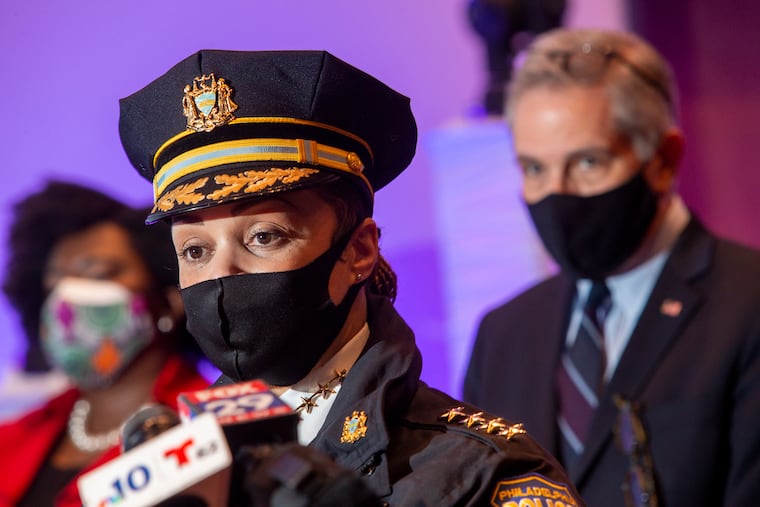A leaked memo suggests Philly police use vehicle stops to get around stop-and-frisk reform
City Councilmember Isaiah Thomas, who introduced legislation banning certain vehicle stops, said he’d seen the memo and found it “outrageous.”

For the last decade, the Philadelphia Police Department has been under a monitoring agreement because of a federal lawsuit, Bailey v. Philadelphia, that alleged police were illegally targeting Black residents for stops and searches without proper justification. And, since last year, City Council has been negotiating with the department on proposed legislation that would ban police stops for vehicle code violations, instead mailing out citations.
That’s why, to police reform advocates, a leaked February memo attributed to Third Police District Capt. Brian Hartzell was troubling.
In the memo, Hartzell directed officers in his South Philadelphia district to conduct more car stops and to issue more code-violation notices, and said that intensified enforcement was requested “in return for the fairness I have been giving in terms of granting vacation.” He added that he was not asking “for anything crazy,” just at least one “park and walk” foot patrol per tour.
Most concerning, to some, he added: “Also, motor vehicle codes give officers probable cause for a stop which avoids the issues we have with the Bailey Agreement.”
» READ MORE: Explore our timeline of the history of police violence against Black people in Philadelphia
City Councilmember Isaiah Thomas, who introduced the legislation banning certain vehicle stops, said he had seen the memo and found it “outrageous.”
“If it is true, it’s extremely upsetting and disappointing that this is where we are currently in the city of Philadelphia,” Thomas said.
He said overuse of car stops raises civil rights concerns and poses little tactical advantage in Philadelphia’s crisis of gun violence. An analysis by the Defender Association of Philadelphia found that only 0.17% of vehicle stops resulted in the recovery of a weapon. About 75% of those stopped, searched, or frisked by Philadelphia police were Black, the organization reported last year.
“This has to do with racist practices we know have existed for some time that have disproportionately affected people of color,” Thomas said. “We know every time you get it right, you’re getting it wrong 97 or 98 times.”
Hartzell, the police captain who wrote out the memo, referred questions to a police spokesperson, who said the captain’s request was within departmental guidelines.
“The C/O [commanding officer] is encouraging his personnel to pay attention to [motor-vehicle code] violations, particularly with the number of complaints the command regularly receives to that end (Drag Racing, Loud Music, or ‘Boom Cars’, rolling stop signs, etc., etc.),” Sgt. Eric Gripp said in an email.
The district stretches from above South Street south to below Pattison Avenue, where extremely loud cars have at times drawn complaints from as far away as South Jersey.
A Defender Association analysis of stops in the Third District found that Black people account for 8% of the district’s population but 38% of drivers stopped for motor-vehicle code violations there.
Defense and civil-rights lawyers said the suggestion that police could turn to vehicle stops to circumvent scrutiny under the Bailey lawsuit has been a long-standing worry.
Since that lawsuit was filed in 2010, the overall number of police stops of pedestrians has declined. And the number of stops without any justification fell by 92% from 2016 to 2020, according to the city.
“What seemed to happen when we saw the pedestrian stops going down was we saw the disparities explode on vehicle stops — not just the number, but the racial disparity,” said Michael Mellon, a lawyer with the Defender Association of Philadelphia.
To Mellon, the memo appeared to confirm his fears that stop-and-frisk policing had simply moved from the sidewalk into the street. “This has been something that we suspected based on the city’s own data.”
David Rudovsky, a civil-rights lawyer who has led the Bailey lawsuit, said the memo surfaced just as the city and plaintiffs were drafting proposals in response to an order by U.S. District Judge John Padova to root out racially biased policing with improved assessment, training, and accountability procedures.
“What’s troubling about this memo is that it’s inconsistent with everything the commissioner and the Law Department have been trying to do under Bailey and inconsistent with good police practices,” Rudovsky said.
Rudovsky said the proposal to increase code-violation notices — often given for “quality of life” stops for offenses like open liquor containers or public urination — raised similar concerns. He and his co-counsel, including lawyers for the ACLU of Pennsylvania, have advocated a new approach, such as an enhanced 311 system that would bring non-police responders to address such complaints.
A lawyer for the city rejected the idea that nuisance stops are driving racial disparities.
“Many ‘quality of life’ offenses stem from activities that may be considered a nuisance to residents who live in a neighborhood,” First Deputy City Solicitor Craig Straw said in a court filing. “As such, the City intends to include the community of Philadelphia in any decision to change ‘quality of life’ offense enforcement.”